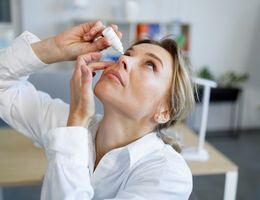Health library
Back to health libraryDry eye: When tears just won't flow

Dry eye can be quite uncomfortable and can cause vision problems. While there is no cure, simple treatments can help.
Some people may take their eyes and vision for granted. But many problems can affect vision or damage the eyes. One such problem is dry eye.
Millions of Americans have dry eye, according to Prevent Blindness. Most of those affected are women.
The condition occurs when your eyes don't produce enough natural tears. Normally, every time you blink, these tears wash and soothe your eyes. Without the tears, your eyes may become uncomfortable and your vision may become unclear.
One cause of dry eye is Sjögren's syndrome, an autoimmune disorder that sometimes is linked to rheumatic or connective tissue diseases, such as rheumatoid arthritis or lupus, according to the National Institutes of Health. Other eye diseases may also cause the problem. Unfortunately, many times doctors don't know why a person doesn't produce enough natural tears.
If you have ongoing symptoms of dry eye, consult an eye doctor. Symptoms may include:
- Burning or stinging.
- Particles in the eye.
- A gritty, sandy feeling.
- Itchiness.
- Redness and inflammation.
- Stringy mucus.
- Extreme sensitivity, especially to cigarette smoke.
If you have dry eye, your doctor will determine the best way to treat it. Prevent Blindness offers these tips:
- Purchase over-the-counter tear replacements called artificial tears. These eye drops will help lubricate your eyes and make them more comfortable. Your doctor will instruct you on how best to use them.
- Use a humidifier to keep moisture in the air.
- Avoid hair dryers, overly warm rooms and cigarette smoke.
Reviewed 4/22/2025
